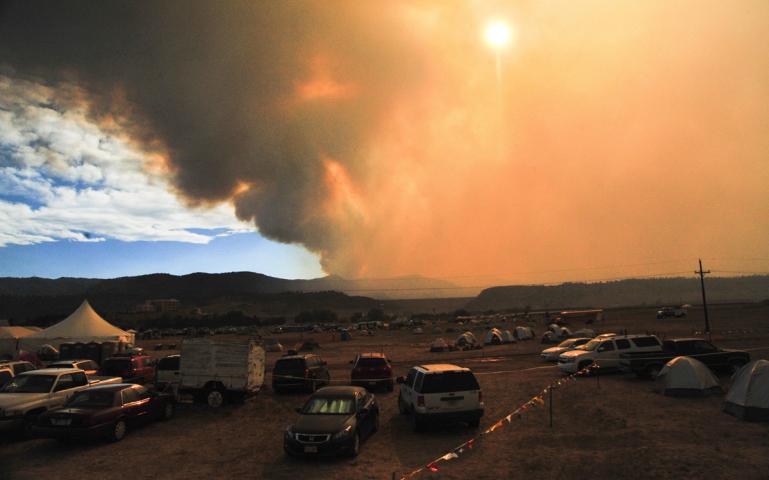
Last week the IPCC released its report on global warming of 1.5°C. This special report highlights the impacts of global warming on natural and human systems, offers mitigation options, and calls for an increased global response to this growing threat. We decided to ask our interns to respond to this report because their generation is going to be the most affected by this dangerous global warming. You can see the official Sierra Club statement on the report and then Check out the SC article on this report in Sierra Magazine here.
Anna Powell - Communications Intern

When I first read the IPCC report, I felt a mix of emotions. One of those was anger. There is evidence all around us that climate change is continuing to escalate. Almost every day in the news we hear reports on the effects of sea level rise, increased droughts, extreme natural disasters, and wildfires. Yet even with all this evidence, a large amount of people in America refuse to believe in climate change. I felt very upset that our country is so apathetic towards climate change, and that our government refuses to take progressive action on climate issues.
After further thought and reading, I soon became extremely overwhelmed. The findings show that we have only 12 years to get our act together. If greenhouse gas emissions continue to rise at their current rate, the world is going to be in a lot of trouble. By 2040, our coral reefs will have declined by 70-90%, many marine and coastal ecosystems will be destroyed, and natural disasters will continue to grow in number and severity. That is not a world I want to live in. There is so much work that needs to be done in order to slow down global warming, and initially it left me feeling a little disheartened.
Eventually I calmed down and realized that these emotions were not helpful, and wouldn’t do anything to help the problem we are now faced with. The only thing we can do is fight for change. I hope that this report serves as a wake up call for our country. With elections coming up, now is the time to get out and vote for candidates who take climate change seriously and will work hard to lower greenhouse gas emissions. I believe that we can slow global warming if serious changes are made in sectors such as energy and transportation. If enough people come together for this change, we can make it a reality.
Kieren Rudge - Beyond Coal Intern

The recent IPCC report shows the severe consequences of a 1.5 ℃ rise in global temperature and provides evidence that demonstrates the urgency of addressing climate change. The report also highlights the impending damage that climate change will have on the most vulnerable populations, such as elderly people, disadvantaged minority communities and people with low-income. While this report shows more dramatic predictions than in previous years, the weight of climate change has been building for a long time. I am reminded of climate change everyday when I try to eat sustainably, when I try to bike instead of driving, or when I see smokestacks around Baltimore. Climate change is here and the need to address it grows stronger each day. Without significant action by citizens and governments, the fossil fuel, agriculture, and transportation sectors will drive the planet towards an uninhabitable future. The public has a responsibility to hold the federal government accountable and also can influence global warming outcomes by consuming energy, food and transit responsibly. While citizen participation is important, the federal government wields a large amount of power through the EPA and congressional mandates on greenhouse gas emissions.
As shown in the supreme court case American Electric Power Co. v. Connecticut, greenhouse gas emitters cannot be sued for the public nuisance claim of contribution to climate change. This means that corporations are accountable to regulations on emission, but not necessarily the negative effects of climate change. This precedent shows the need to act now and put strict caps on emissions while working toward sustainable, renewable energy solutions. As shown in Massachusetts v. EPA, greenhouse gas emissions can be regulated under the Clean Air Act, and therefore the federal government has all the power it needs to take swift action. It is heartbreaking that the Trump administration is reversing the progress that was happening, and as a country we need to take political action to swing congress to an environmentally conscious agenda. Following international protocols, such as the Paris Accords will lead to many countries decreasing emissions, but without the U.S. involved in that reduction, the world, including more vulnerable populations, will be in jeopardy from the U.S. contribution to climate change. I believe that if we come together now, and work in full force the world can be in a better state than it is even now. I hope that the future has coral, glaciers, clean air, enough food and pristine natural spaces. The IPCC report has driven many people into a state of despair where they have given up on trying, but now is the time to act, and if a large number of people agree on that then the planet has a chance to be healthy and habitable for humans in the coming decades. The future could be an incredibly bleak one filled with barren wastelands and more death, and while that is overwhelmingly terrifying we owe it to ourselves, future generations, and all life on Earth to fight right now.
Semir Abdul - Transportation Intern
 The IPCC recent report on the effects of a 1.5 degree Celsius increase in global temperatures shows the immediate need to take massive action to ensure a safe future for generations to come. As humanity, it is imperative we utilize the potential and realized synergies between the global community across multiple levels of agency. Awareness of context-specific situations in certain geographies is a tantamount trait, that if adapted, will allow for easier and sustainable integration of low-carbon development strategies. The ability to implement change fast enough will depend on the interconnectivity of environmental-ecological, economic, technological, socio-economic, and institutional sectors in these context-specific situations. This should no longer be a partisan issue. The past, present, and future are all in interplay with where we are now and where we will be if we do not take the steps necessary to abate these realities. The report takes ethics as one of its fundamental mission goals, showing the awareness of the unequal distribution of climate effects on poor and marginal communities. In order to keep global increases in temperature below 1.5 degree Celsius it will be necessary to use inclusionary principles and bottom-up practices. Environmental justice needs to be at the forefront as some societies have already been experiencing 1.5 degree Celsius increases in temperatures in at least one season.
The IPCC recent report on the effects of a 1.5 degree Celsius increase in global temperatures shows the immediate need to take massive action to ensure a safe future for generations to come. As humanity, it is imperative we utilize the potential and realized synergies between the global community across multiple levels of agency. Awareness of context-specific situations in certain geographies is a tantamount trait, that if adapted, will allow for easier and sustainable integration of low-carbon development strategies. The ability to implement change fast enough will depend on the interconnectivity of environmental-ecological, economic, technological, socio-economic, and institutional sectors in these context-specific situations. This should no longer be a partisan issue. The past, present, and future are all in interplay with where we are now and where we will be if we do not take the steps necessary to abate these realities. The report takes ethics as one of its fundamental mission goals, showing the awareness of the unequal distribution of climate effects on poor and marginal communities. In order to keep global increases in temperature below 1.5 degree Celsius it will be necessary to use inclusionary principles and bottom-up practices. Environmental justice needs to be at the forefront as some societies have already been experiencing 1.5 degree Celsius increases in temperatures in at least one season.
Standing idly by is no longer an option when you are granted the foresight to see the outcome of reluctance to change the norms. It is important that all people realize the past and current structure of our energy systems are not concrete and unadaptable. Our global system is dynamic, always changing, and always will change. The flexibility of that change when faced against deleterious pressures and challenges, such as increasing global temperatures, depends on the awareness and willingness of individuals and global societies to be flexible as well. This means the 2 degree Celsius increase in global temperatures future prediction can change if enough agency and synergies are realized. At a national level, the policies are in place that allows the federal government to take action on improper uses that breach regulations or ACTs. In 2008, the supreme court case, Massachusetts v EPA, gave the federal government the power to set greenhouse gas emissions when a group of states, local governments, and private organizations alleged in a certiorari that the EPA has abdicated its responsibility under the Clean Air Act to regulate the emissions of four greenhouse gases, including carbon dioxide. Incidents such as these cases, show the power we hold when we come together to challenge improper abdication of responsibility from the agencies we depend on to protect the public and the Earth from harm.
The IPCC report focused on implementing change through governmental policy instead of focusing on businesses kickstarting change. This is because businesses must adhere to governmental action causing a ripple effect across different sectors spatially and temporally. It takes multiple interests to make sure governments and organizations uphold their rules and instills new ones as we adapt to new environmental difficulties to insure the betterment of society. The IPCC report also realistically mentions that there is no one certain path toward guaranteed This path will be difficult, but together we can face the challenges with a positive mindset and framework built upon trust, understanding, kindness, and respect.
I will no longer wait for the president or corporate polluters to get the big picture. I will be a part of the mobilization of grassroots efforts to influence the structure we have the innate power to give voice on. The IPCC report to me is not a mere scientific study, but a beacon of light that can wake up the populace. In order to make the best use of the report, we must actively listen to our peers, rather than feed it down their throats. For progressive change comes from understanding and respect. I believe happiness in our lifetime is intrinsically linked to the happiness of others on the Earth we all have the privilege to share and the Earth we leave our future brethren to inhabit and experience. Becoming a part of the story causes ripple effects through space and time that will lead to the solution. You just saved the world and you didn’t even know it. We can do this. We will and are.
Harlon Dobson - Energy Intern

On October 6, the Intergovernmental Panel on Climate Change released a special report on the impacts of climate change and predictions for what is to come. The report’s purpose was to measure how the world will be affected if the global temperature increases to an average of 1.5°C above pre-industrial levels. The global temperature is predicted to reach this mark between 2030 and 2052, and is likely to rise far above 1.5°C if we continue with our current rate of emissions. After this report was released, a slew of articles came out highlighting how we can help slow down the rate of global climate change, with suggestions ranging from buying an electric car to cutting out meat. While these solutions do address causes of climate change, they are not sufficient to address causes of our climate change.
Our climate change is one that’s occurring at a rate never before seen in terms of both geological and human history. There have never been sharper spikes in global carbon emissions in the entire pre-industrial era than in this particular window of time since industrial capitalism began, less than 200 years ago. However, most of us are kidding ourselves if we feel a pang of guilt at this. I say this because 100 companies are responsible for 71% of global emissions. This is our climate change. The reason we’re having issues with climate change is because of the greed and carelessness of these companies. Over 95 them are large-scale fossil fuel providers. The American embodiment of individualism has paradoxically caused us to engage in environmentally friendly practices that are communal in theory, but individualistic in practice. While using a reusable straw for your coffee is all good and well, it’s nowhere near what we should be doing for swift, effective change. The fight for a future for our world does not depend on superficial lifestyle changes. Until these companies receive pressure and commit to clean environmental practices, none of our efforts to slow climate change can be effective and none of our demands will be met.
For them, there is no reason to stop their current practices; they’re still making money. The most effective form of pressure for them is political pressure. This begins at elections. The midterms are less than two weeks away and the early voting period is happening right now in most states. Our vote is our most valuable weapon in this fight. Not your vote, but all of our votes. Just voting and going home won’t do anything but maintain the 1.5°C status quo. Local get out and vote campaigns, handing out Sierra Club green ballots highlighting environmentally-friendly candidates running for all levels of government, carpooling to polling places and any other unique form of community engagement for election day is what will save our environment.
The best way to fight this fight is by going from the top down. These companies have taken the world hostage with their archaic practices. The literal fate of the world rests in their choice to continue or stop the damage. I don’t want this to be a choice for them. I want to elect candidates that will take a hard stance against these companies, I want any veiled attempts by these companies to weasel their way out of responsibility to be undermined, and I want them to be told, not asked, to stop this once and for all. 100 companies in the world are responsible for 71% of global emissions. This should not be a negotiation.